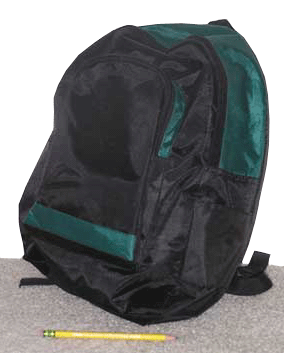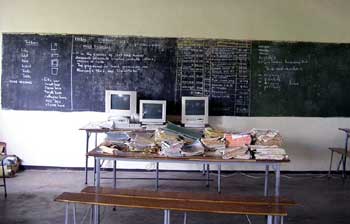|
 In
October of 2006, HopeFirst Foundation initiated its pilot
project, "The HopeFirst
Backpack Project." One of
the biggest challenges for AIDS orphans is attending school. There
are school fees to be paid, school uniforms are required, and these
children need to find a way to help support themselves and other children
in the family; attending school does not bring in money and it does
not buy food. School becomes an unaffordable luxury. The BackPack
Project would provide some supplies to these children, and some
cash donations that HopeFirst received would be used to help pay
school fees for a few of them. In
October of 2006, HopeFirst Foundation initiated its pilot
project, "The HopeFirst
Backpack Project." One of
the biggest challenges for AIDS orphans is attending school. There
are school fees to be paid, school uniforms are required, and these
children need to find a way to help support themselves and other children
in the family; attending school does not bring in money and it does
not buy food. School becomes an unaffordable luxury. The BackPack
Project would provide some supplies to these children, and some
cash donations that HopeFirst received would be used to help pay
school fees for a few of them.
 HopeFirst partnered with two schools in
the United States, South Whidbey Intermediate School on Whidbey
Island in Washington State, and Edwin Rhodes Elementary
School in Chino, California), to deliver school supplies
to students in a rural school in Zimbabwe.
These two schools collected a small mountain of supplies
to stuff into backpacks purchasedby HopeFirst. Along with the school supplies,
students sent letters, photos, and drawings. We also received wonderful letters and a contribution from students
in the After School Assistance Program at Mount Vernon High School in Washington to deliver to the students. We also took some
supplies specifically for the teachers. Cash donations
enabled HopeFirst to help contribute toward required school fees and nutritional supplement for some
of the children. HopeFirst partnered with two schools in
the United States, South Whidbey Intermediate School on Whidbey
Island in Washington State, and Edwin Rhodes Elementary
School in Chino, California), to deliver school supplies
to students in a rural school in Zimbabwe.
These two schools collected a small mountain of supplies
to stuff into backpacks purchasedby HopeFirst. Along with the school supplies,
students sent letters, photos, and drawings. We also received wonderful letters and a contribution from students
in the After School Assistance Program at Mount Vernon High School in Washington to deliver to the students. We also took some
supplies specifically for the teachers. Cash donations
enabled HopeFirst to help contribute toward required school fees and nutritional supplement for some
of the children.
One
summer day in December 2006, HopeFirst Foundation ambassadors Diana and Kim visited rural Kadyamadare
School, about an hour from Harare (Zimbabwe's largest city).
We had selected this school for our flagship project, the HopeFirst
Backpack Project. Kathy C from Harare International School (HIS),
has been working with Kadyamadare for more than a decade. The U.S. School
was not in session while we were in Zimbabwe, but we did have the
chance to tour the grounds, and meet the headmistress,
Sekayi.
 PROJECT OUTCOME PROJECT OUTCOME
The
teachers in Zimbabwe were overjoyed to receive school supplies for
their students.
We received letters
back from the students in Zimbabwe to give to the children here. As a global exchange
between children, this project accomplished our objectives of interchange. Diana has talked with teachers on Whidbey Island
about developing a school curriculum on children learning the importance
of becoming global citizens. Working with our youth is critical
in creating global solutions.
We also heard from
many teachers that they wanted to help the teachers in Zimbabwe. Given the situation in Zimbabwe, our ability to act widely has been somewhat constrained, however, we have been able to continue our work in an ongoing exchange.

Thank
you so much to everyone who contributed and participated in
this project!
Backpack
Supply List
List of items collected for the Backpack Project.
Our
Partner Schools: Edwin Rhodes Elementary School
Mrs.
Krupnick's fourth grade class is composed of Gifted and Talented
students from all corners of the Chino Valley Unified School District,
which covers the cities of Chino, Chino Hills and parts of Ontario,
California. Our school, Edwin Rhodes Elementary School, is only
4 years old and is located in an area of Chino that used to be filled
with dairy farms. The dairies have been largely moved to another
section of California, and are gradually being replaced by new homes.

A
majority of our students are first-generation Americans, with cultural
backgrounds that span the earth. Our international feasts reflect
the diversity that makes California and the United States so rich.
Chino
is about 35 miles east of Los Angeles, which means that within an
hour's drive we can be at the ocean, in the mountains, or in the
desert (or in Disneyland!). We have a Mediterranean climate that
gives us hot, dry summers and mild, sometimes rainy winters. We
get a lot of sunshine and love to spend our time outdoors. Students
are involved in many different sports, especially soccer.
Return
to Top |

